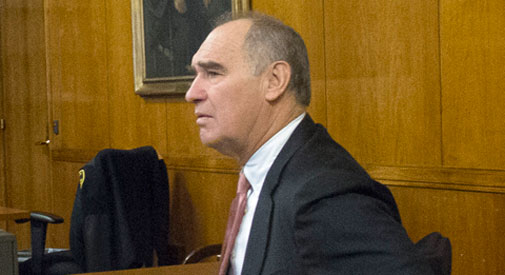Appeal filed in courthouse redevelopment, lawyer arguing wrong precedent applied

Attorney Mark Bobrowski, representing East Cambridge residents opposed to a courthouse redevelopment, says the Land Court judged wrong in approving construction. (Photo: John Hawkinson)
The next step in the long, slow litigation about East Cambridge’s former courthouse happened Monday.
Neighbors Michael Hawley, Graham Gund, Marie Saccoccio and Roger Summons filed their opening brief with the Massachusetts Appeals Court, appealing the May decision from the Land Court that favored developer Leggat McCall. The notice of appeal had been filed in July, but the first brief was not due until this week.
Leggat was selected in December 2012 by the state to redevelop the asbestos-laden 22-story tower that sticks up out of the East Cambridge residential neighborhood. The Planning Board approved plans for the redevelopment in September 2014. The approved replacement would be a 20-story red terra cotta office tower, with 24 units of housing: eight affordable, eight middle-income and eight market-rate.
Hawley appealed the Planning Board’s decision in November 2014, arguing that because the Edward J. Sullivan Courthouse did not comply with Cambridge zoning when it was built, it could not qualify as a “lawful nonconforming” use, a legal requirement for the board to grant the redevelopment permit.
Leggat has a month to file its reply, as do its fellow appellees in the case: the city, because the lawsuit appeals the Planning Board’s grant of a special permit, and the state, because it owns the building. The city is expected to request an extension of time.
The court’s schedule suggests the case might be heard by a three-judge panel in late spring.
Argument is the same
At the appeals court, Hawley’s attorney Mark Bobrowski makes much the same argument he made before the Land Court, and simply argues that the court made the wrong decision. In essence, it boils down to whether one particular precedent is valid, a 1986 case called Durkin v. Board of Appeals of Falmouth. It involved a Falmouth post office that was converted to private use, and the case made multiple trips between the courts and zoning board.
All the parties agree Durkin was a confusing decision, with Robert Foster, the Land Court judge, calling it “too vague” and “sloppy.” But Foster based his ruling on it anyhow.
Durkin was interpreted by Foster to mean that a structure built under governmental immunity from zoning – as the courthouse was when built by Middlesex County – qualified as lawful nonconforming.
Bobrowski, a noted land use expert who literally wrote the book on Massachusetts Land Use and Planning Law, disagreed. In his appeal, Bobrowski tells the court that Durkin’s facts “are not at all clearly set forth in the reported decision.” Examining the briefs from Durkin, it became clear the court sent the case back to the Falmouth zoning board for further analysis, he said. Further, the post office at the center of Durkin was never built under immunity because Falmouth zoning at the time allowed structures for “all municipal purposes” – but the court didn’t know that.
Bobrowski finds fault with the Land Court decision in other ways: He argued it should not assume the city’s Planning Board was correct when it found the building to be legally nonconforming; that the proper precedent is Mendes v. Board of Appeals of Barnstable, a 1990 variance dispute; and that the Land Court should have considered three cases from other states, including one about the immunity of Richard Nixon’s helipad in Key Biscayne, Fla., 35 years after he resigned from the U.S. presidency.
Hawley said he thought Foster’s lack of consideration of Mendes was “awfully lame and provincial” because Durkin was misapplied and not on-point.
After the Land Court decision, Bobrowski said he had intended to ask the Massachusetts Supreme Judicial Court to consider the case directly, bypassing the Appeals Court. But by October, that strategy had changed, and he went the “usual” route, he said. “There’s no particular strategy there,” Hawley said.


Peace Be Unto,
The homeless sector and mosaic also has a legal rights when it comes to the Sullivan Court House. Both state and and regional federal authorities are aware of it, but they stand by and allow, this ungodly sale of the Sullivan Court house to stand and go nearly uncontested. Even the Faith Base community has right to this building that are being trampled upon.
The federal and state departments of health, and don’t forget the Cambridge Department of health, they have gone on official record declaring that ending homelessness was their highest priorities. Elsewhere both state and federal goverments have given or donated, government property for $1 dollar or sometimes nothing at all to various entities that plan conversion uses for ending homelessness.
Finally this is part and parcel, of a naferious scheme to trample on poor peoples rights, especially in the Kendall Square district. Belive it or not, the poor do have rights there in Kendall Square, that the real estate and developer peoples are trampling upon.
Finally, If you don’t want to take my words for it, ask your elected officials, and you’ll be very surprise in what the say.
Yours In Peace,
Mr. Hasson J. Rashid
Peace,
What going on, my comment to this posting has been “awaiting moderation,” for nearly two weeks or more? Surely it should have been approved or denied for posting in reponse to the article by now.
Peace,
Mr. Hasson J. Rashid
Peace,
Thank You,
Hasson